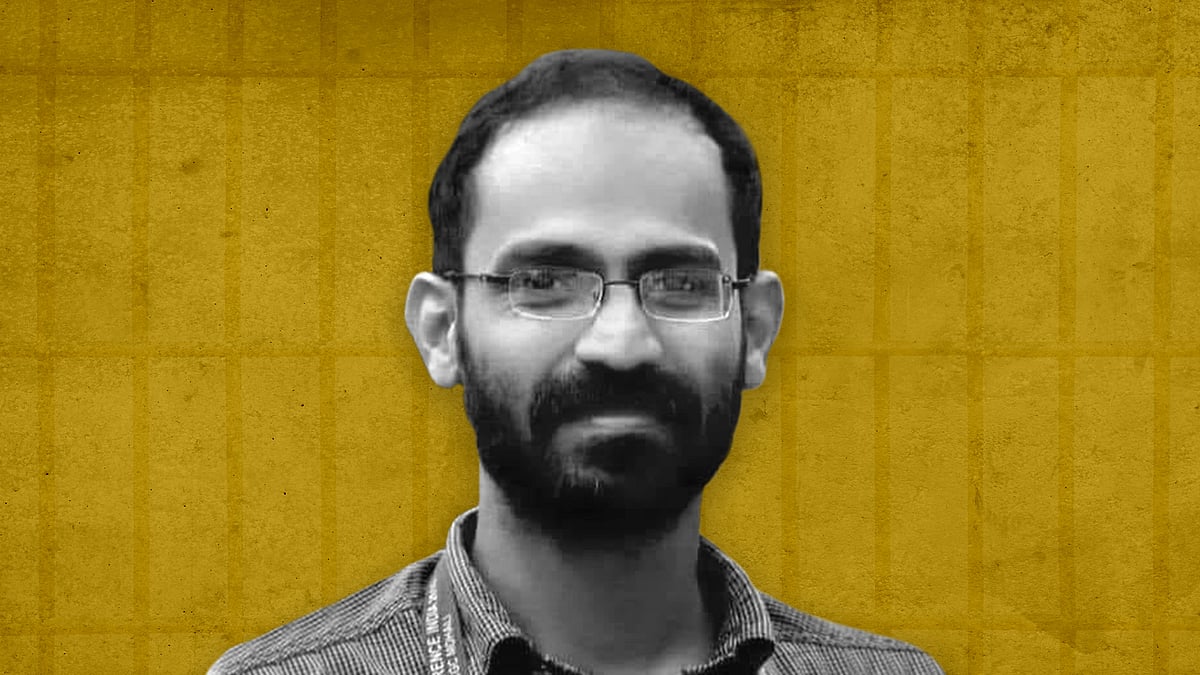How is ‘Justice for Hathras’ website connected to Siddique Kappan? UP police won’t tell
A series that looks at the 5,000-page chargesheet and the case being built against the Kerala journalist.
Listen to this story:
Early this month, journalist Siddique Kappan completed one year in jail. The Uttar Pradesh police has filed an over 4,500-page chargesheet in the case that paints Kappan as guilty more through a web of conjectures than with the help of material evidence. After a detailed conversation with Kappan’s lawyer Madhuvan Dutt Chaturvedi, who has inspected the chargesheet, Newslaundry presents a series that will explore the UP police’s charges against Kappan.
One such example of tenuous evidence is the disclosure statements by Siddique Kappan and Atikur Rahman in police custody, allegedly taking responsibility for the “Justice for Hathras Victim” portal. In source-based media reports last year, it was stated that the UP police believed that this website was set up to organise violent protests on Hathras and cause riots. Note that the disclosure made under Section 161 of the Code of Criminal Procedure will have no evidentiary value in court. Earlier, courts have held the view that statements recorded by police in custody cannot be used against the accused. Moreover, there is no material evidence that establishes the link between the website and the accused.
In a note dated November 4, 2020, the UP special task force submitted a statement by Kappan reportedly stating that after it was revealed that members of the upper caste were behind the rape and murder of a Dalit woman in Hathras, the “Justice for Hathras Victim” portal was set up in order to “incite Dalits and cause riots.”
The note also quoted Kappan mentioning his association with Thejas (a newspaper) and that his work included trying to “connect those having radical Muslim mindset with Popular Front of India (PFI).”
Setting up the portal
Kappan was quoted as saying in his statement that he and Atikur Rahman were members of several groups on WhatsApp and Facebook where they reportedly posted caste-related and communal content in order to “incite people against the government” with an intention of “causing riots”.
The statement further added that in order to protect themselves from police action, the “Justice for Hathras Victim” portal had been set up on hosting website Carrd.co.
In April this year, the UP STF stated that it had recovered 1,717 documents at the time of the arrest from the four accused in the case: Atikur Rahman, Mohd Alam, Siddique Kappan and Masood Ahmed. Print-outs from the “Justice for Hathras Victim” portal were among the documents recovered by the police.
According to the statement recorded in police custody, Kappan also said that “they are in favour of an Islamic State and work (to promote) fundamentalism”.
Referring to the chain of events after the death of the Hathras rape victim in Delhi on September 29, 2020, the statement said the “Justice For Hathras Victim” portal was shut down on October 4. It has been reported that Carrd.co is an online platform used frequently for internet-based civil rights protests including the Black Lives Matter protests.
Response by Carrd.co
In a note dated October 29, 2020, a UP police officer submitted findings related to Carrd.co website, according to the lawyer who has examined the files.
The UP STF’s investigating officer stated that they reached out to Carrd.co at their email ID ticket-support@carrd.co. In response, the website informed the STF that they had received an “abuse report” with respect to the “Justice for Hathras Victim” portal. Citing clause 5 (c) under their terms and conditions that has provisions related to “user content constituting criminal offence”, Carrd.co had explained why the portal was taken down on October 4, 2020.
Carrd.co’s response also said that the hosting website didn’t have any information about the host who had bought the domain name “Justice for Hathras Victim”.
“A satisfactory response hasn’t been received. The website had been used to upload content specifying how to incite riots and prevent oneself from them. This seems to be an irresponsible answer by the hosting website,” the investigating officer was quoted as saying in the chargesheet.
In another note dated December 3, 2020, it was reiterated that there has been no information regarding the name, address, mobile number and IP address from the hosting website. This note also added that “it seems that the portal has been deleted only to protect oneself from police’ action”.
The investigating officer also referred to the fact that they had reached out to Carrd.co on October 29, October 31, November 6, and November 9 via mail but didn’t get any response.
Disclosure statement by Atikur Rahman
The disclosure statement by another accused, Atikur Rahman, bears a striking resemblance to that of Siddique Kappan’s.
Rahman reportedly said, “We want to connect those with a radical Muslim mindset for establishing an Islamic State.” Elaborating further on the need to set up the “Justice for Hathras Victim” portal, Rahman was quoted as saying that since their ideology revolves around creating instability for the government, therefore, the portal was set up in order to save themselves from [police] action.
But when the portal was shut down on October 4, they reportedly decided to visit Hathras. The statement further suggested that Kappan, Rahman and others went to Hathras but returned since “they didn’t have requisite weapons and petrol that can cause riots.”
The disclosure statement does not delve into whether Rahman or Kappan had made any payment to Carrd.co for the purchase of domain name “Justice for Hathras Victim”.
Statements of eyewitnesses in Hathras
The chargesheet quoted statements from four eyewitnesses in Hathras who have allegedly identified Siddique Kappan and Atikur Rahman among those “who had visited the village of Hathras rape victim days after her death at Safdarjung Hospital in Delhi.” These statements were submitted in the form of a note dated November 7, 2020.
Madhuvan Dutt Chaturvedi, the defence lawyer in Kappan’s case, denied these allegations, saying that Kappan and others were on their way to Hathras when the police arrested them.
All the eyewitnesses referred to miscreants trying to incite violence as “bahari log”, or outsiders, and went on to explain how “their targets were those from the Thakur community”.
Speaking to Newslaundry, lawyer Wills Mathews, who is representing Siddique Kappan in this case, said, “Disclosure statements are not admissible as part of evidence. In this case, the statements are full of contradictions and improbable too.”
Responding to whether the inclusion of disclosure statements in the chargesheet seemed to be a maneuvering tactic on the part of the investigating agency, Mathews said, “In almost all criminal trials it so happens that stories are made justifying the alleged offences but the ultimate test is trial. Generally these stories will get disproved at the time of trial.”
Emphasising on the fact that he hasn’t received a copy of the chargesheet yet, Mathews added, “He [Kappan] himself has volunteered to undergo narco analysis or any other scientific test to prove his innocence.”
Misuse of disclosure statements
Confessional statements included in the chargesheet came under the scanner recently during the cases related to 2020 Delhi riots. As reported by Scroll, in the case of death of Delhi police head constable Ratan Lal, among the 17 Muslim men arrested, seven had identical disclosure statements, thus raising questions regarding the veracity of such statements.
Newslaundry has reported earlier on how Zee, Print and ANI had often packaged legally inadmissible disclosure statements as “confessions” of former Aam Aadmi Party councillor Tahir Hussain, Jamia Millia Islamia students Meeran Haider and Asif Iqbal Tanha, and Delhi University student Gulfisha Fatima.
The chargesheet filed by the UP STF in connection with FIR no. 199/2020 in Mathura seems to be another instance of the “misuse” of confessional statements to prove the police’s theory.
On the issue of the reliability of disclosure statements made in police custody, Supreme Court lawyer Abu Bakr Sabbaq told Newslaundry, “Under section 25 of the Indian Evidence Act, disclosure statements cannot be used against the accused. Yet, police make a note of it and that forms the basis of framing charges.”
Citing the example of Mohammad Nisarudin, who was booked under the Terrorist and Disruptive Activities Prevention Act in 1994, Sabbaq added, “Twenty-two years later, the case was decided by the Supreme Court on May 11, 2016. It was observed that the only evidence was disclosure statement given before the investigating officer, which can’t be proved and so the accused were acquitted.”
 He did not write like a 'responsible' journalist: Why UP police wants Siddique Kappan in jail
He did not write like a 'responsible' journalist: Why UP police wants Siddique Kappan in jail After sedition and UAPA, Siddique Kappan slapped with money laundering charge
After sedition and UAPA, Siddique Kappan slapped with money laundering charge

